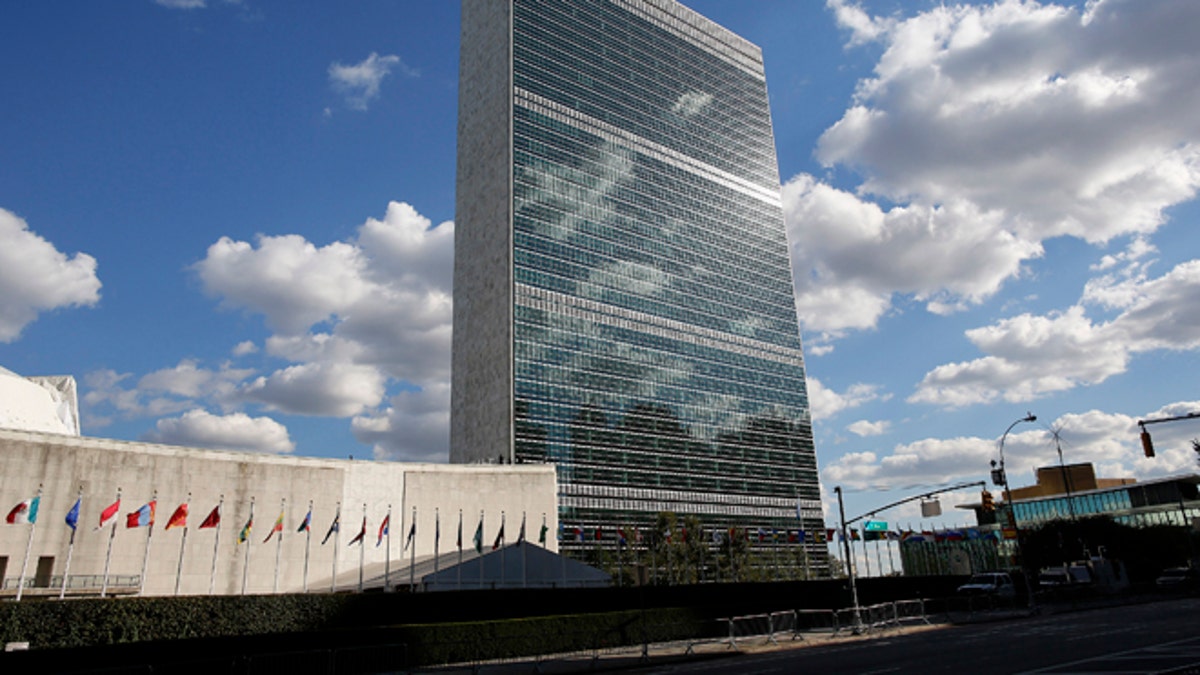
Sept. 24, 2012: Clouds are reflected off the Secretariat Building of the U.N. headquarters in New York. (Reuters)
Negotiators will reconvene this week to try to hammer out a landmark U.N. treaty designed to regulate the multibillion-dollar global arms trade amid objections from a bipartisan group of legislators and the most powerful gun-rights lobbying group in the U.S.
Governmental representatives will meet in New York starting Monday to try to reach consensus on the Arms Trade Treaty, which would require all countries to establish national regulations to control the transfer of conventional arms and to regulate arms brokers.
The draft treaty under consideration does not control the domestic use of weapons in any country, but it would prohibit states that ratify the treaty from transferring conventional weapons if they would violate arms embargoes or if they would promote acts of genocide, crimes against humanity or war crimes.
In considering whether to authorize the export of arms, the draft says a country must evaluate whether the weapon would be used to violate international human rights or humanitarian laws or be used by terrorists, organized crime or for corrupt practices.
Many countries, including the United States, control arms exports, but there has never been an international treaty regulating the estimated $60 billion global arms trade. For more than a decade, activists and some governments have been pushing for international rules to try to keep illicit weapons out of the hands of terrorists, insurgent fighters and organized crime.
Hopes of reaching agreement on what would be a landmark treaty were dashed last July when the United States said it needed more time to consider the proposed accord — then Russia and China also asked for a delay.
The National Rifle Association has portrayed the treaty as a threat to gun ownership rights enshrined in the U.S. Constitution. The politically controversial issue of gun regulations has re-emerged since a gunman opened fire on Dec. 14 at an elementary school in Newtown, Conn., killing 20 children and six educators.
Last July, the NRA's CEO Wayne LaPierre told the U.N. that "the NRA wants no part of any treaty that infringes on the precious right of lawful Americans to keep and bear arms." He added that "any treaty that includes civilian firearms ownership in its scope will be met with the NRA's greatest force of opposition."
On Thursday, Rep. Mike Kelly, R-Pa., introduced a bipartisan resolution opposing the treaty, which states the proposal "places free democracies and totalitarian regimes on a basis of equality" and represents a national security threat.
"As the greatest defender of liberty and freedom in the world – and we have been for the last 236 years – why would we ever sit down with bad actors and let them decide what our policy will be going forward? [It is a] bad, bad idea. It doesn’t make sense," Kelly said at a press conference Thursday.
An identical companion resolution was introduced last week by Sen. Jerry Moran of Kansas, according to Kelly's office.
Secretary of State John Kerry said in a statement Friday that the United States looks forward to working with other countries to reach consensus on an Arms Trade Treaty "that helps address the adverse effects of the international arms trade on global peace and stability" by helping to stem the illicit flow of weapons across borders.
He stressed that the U.S. will not support a treaty that would be inconsistent with U.S. law and the right of Americans under the Constitution to bear firearms, or a treaty that would impose new requirements on the U.S. domestic trade in firearms and U.S. exporters.
"The United States could only be party to an Arms Trade Treaty that addresses international transfers of conventional arms solely," Kerry said.
Kerry said that while the international arms trade affects every country, more than 100 nations don't have a system for controlling international arms transfers.
"We support a treaty that will bring all countries closer to existing international best practices, which we already observe, while preserving national decisions to transfer conventional arms responsibly," he said.
Kerry said that means responsible nations should have control systems that reduce the risk that conventional arms transfers will be used "to carry out the world's worst crimes, including those involving terrorism, and serious human rights violations."
Amnesty International's Deputy Executive Director Frank Jannuzi said President Barack Obama "must not be cowed or intimidated by the U.S. gun lobby and the NRA."
Jannuzi added: "The unfettered trade of conventional arms has contributed to the deaths of more than 500,000, the displacement of millions, widespread rape and the recruitment and exploitation of children as soldiers. The global arms trade must be regulated, and the United States — the world's largest exporter — should lead the way."
U.N. Secretary-General Ban Ki-moon said he is confident that the U.N.'s 193 member states will overcome their differences during the upcoming negotiations and muster the political will to reach agreement on a treaty. The U.N. chief reiterated his support for a treaty that regulates international transfers of both weapons and ammunition and sets common standards for exporting states.
Kerry's statement made no mention of the key issue of ammunition.
Jannuzi said the draft treaty in July had a provision that would ban the export of ammunition in cases where a country decided that the export of weapons was prohibited.
The Associated Press contributed to this report.












































